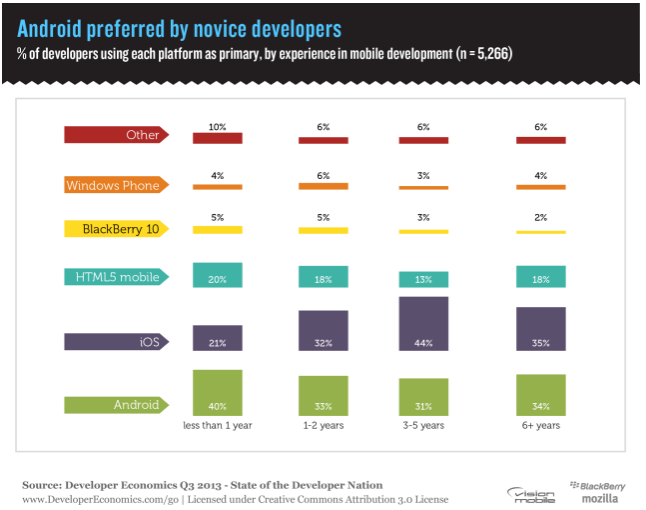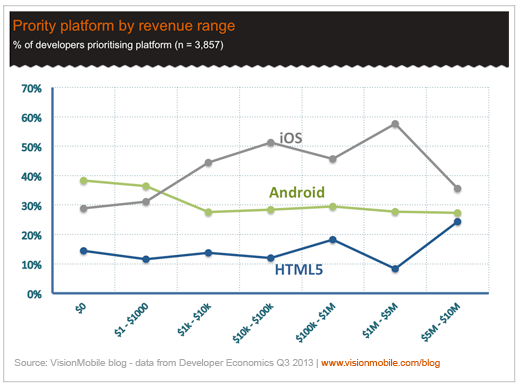The app developer community may have finally hit an inflection point for Android. A year ago mobile developers preferred Apple’s iOS, given superior tooling and revenue opportunities. Yet, today’s developers simply can’t ignore Android’s and outsized and rapidly growing installed base. Practical wisdom would say that the tide of developer interest in Android has to shift eventually, just because it is so massive and global. New survey data from Vision Mobile and Evans Data shows that the shift developer interest may indeed be starting to gravitate to Android while still remaining strong iOS.
See also: Android Tablet Apps Get Their Turn In The Google Spotlight
What it often comes down to is developer maturity and experience. Broadly speaking, the new survey data from Vision Mobile says that the more years a developer has been working on mobile apps, the more likely they are to choose iOS over Android. In many ways, this is informed by geography. The presence of iOS developers and mobile consumers is very strong in the United States and Western Europe and we have seen over the course of the last several years that developers in those markets are better able to monetize their apps. Android performs well in these areas as well but is its reach is much more global, hitting nascent smartphone markets in regions like Asia, India, the Middle East, Latin America and Africa. As more users come online with Android smartphones in emerging markets, we correspondingly see new and relevant interest in developing for Android.
Developers Prefer Android
According to Vision Mobile, 34.4% of developers now choose Android as their primary application platform, compared 32.7% that first target iOS. On average, developers target 2.9 different platforms for mobile development, indicating we live in a multi-platform world. But forced to choose where to start, more go with Android.
This trend is more pronounced in tablet application development. According to a new Evans Data developer survey, 84% of those that want to develop for tablets target Android compared to 62% targeting iOS and 52% targeting Windows.
Emerging Markets, Emerging Opportunities
A little over a year ago, GigaOm surveyed the developer landscape and found that most app programmers were in North America or Western Europe. Since that is where they lived, they localized apps for those particular markets. Today there are signs that this is changing.
For example, Vision Mobile’s survey of 5,266 developers shows a clear preference for Android among new developers (see chart below).

This data doesn’t necessarily mean Android is easier or more approachable platform, though many would argue that it is. Another way to read this trend is to correlate Android development with emerging markets. Much of the growth in mobile device shipments is moving to developing economies, leading to rising developer populations in these regions.
This supposition seems to be borne out by how much Android developers make compared to iOS developers.

This data could be read, as Vision Mobile does, to “lower barriers to entry for Android developers and the use of Android among Hobbyists.” But it seems at least as reasonable to suppose that Android developers make less revenue per application because they’re building for markets that have less money to spend.
A Land Grab For App Buyers
The geography and user base of Android in emerging markets may help to explain the Evans Data finding that Android apps are developed much faster than iOS apps. According to the survey, 41% of developers targeting Android said their typical app is finished in one month or less compared to 36% for iOS and 34% for Windows Phone. As these markets boom, there’s a corresponding boom in the developer population for these emerging markets and a rush to get apps developed as fast as possible.
Apple and its supporters contest that Android serves a “junk market” where devices are bought but not used. As I’ve argued before, this is wrong. Android gets used, but in different ways than iOS devices get used.
The Android vs. iOS developer monetization gap is narrowing. This is likely being driven by developers in established markets that give Android more time and attention, but it’s also being pushed by emerging markets becoming more established. As such, with emerging markets maturing, we’re likely to see Android not only dominate mobile shipments but soon, perhaps, developer wallets.

















